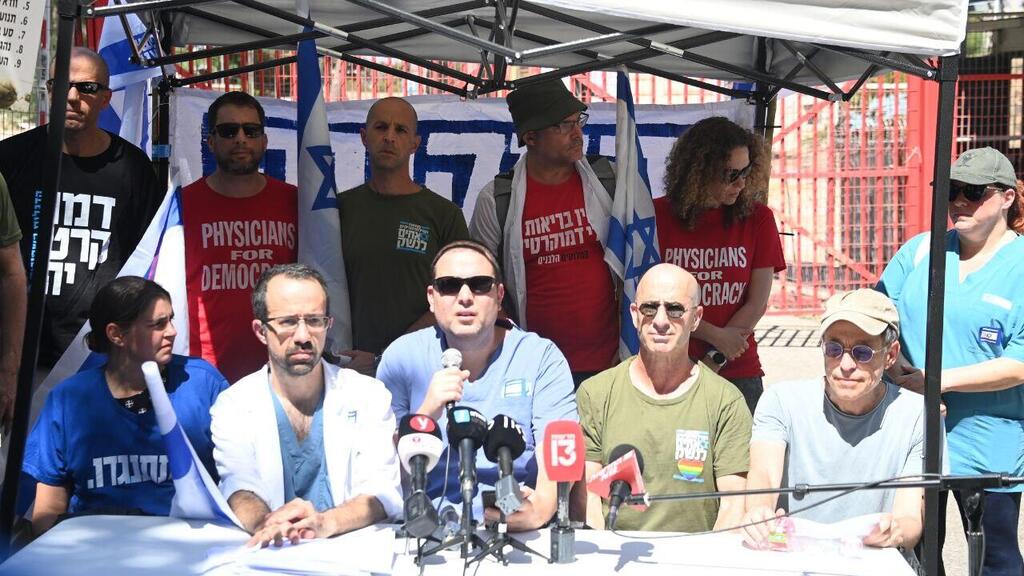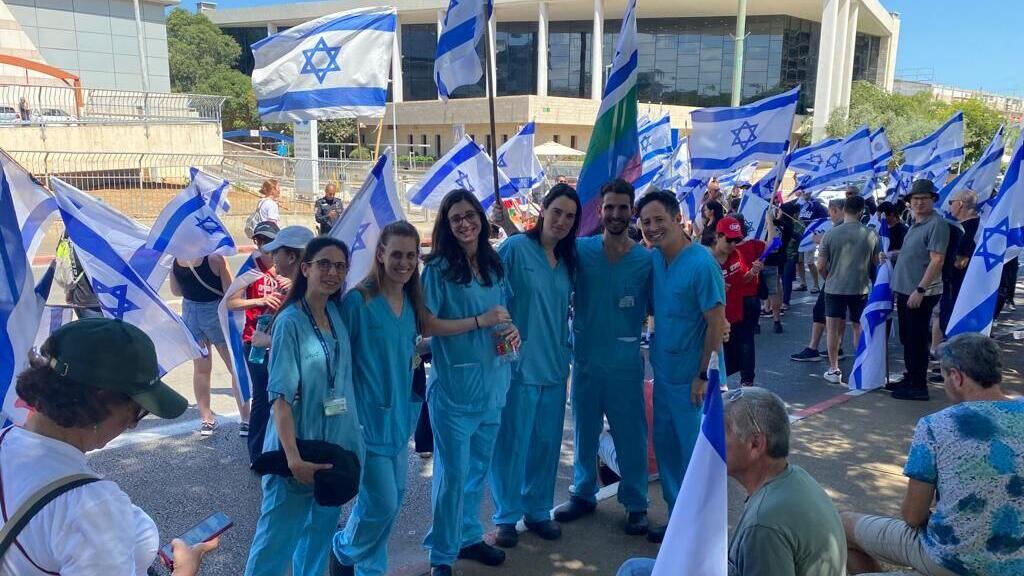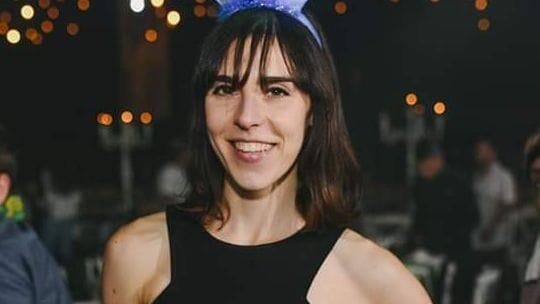The typical evening shift in a city hospital on the east coast of the U.S., where "D" - originally from the Tel Aviv area - works as a neurosurgeon, had a man rushed into the operating room after suffering a neurological event, and after the medical team unblocked his artery and saved his life, the patient was able to speak and banter with his doctors. "Suddenly, I noticed that he had an Israeli accent," recalled D.
Read more:
"I looked at the monitor and saw that he was absolutely Israeli. At that moment, I felt... I don't know how to describe it other than a surge of emotion. Of course, I love treating all patients - black, white, Asian - it doesn't matter to me, but it is always more fun to treat your own people. After all, it's your culture, it's home," D says
After the patient recovered, he invited Moshe, his patient, along with his family to join him at home for a meal. At the end of the gathering, D found himself with a "feeling of longing in his heart." He asked himself, "Why don't I do this more often? Why don't I go back (to Israel)?
"But then, reality quickly hit, and all the red flags resurfaced - the workload, the lack of compensation, and the system in general. And now, on top of all that, there is the judicial reform and the current government. At the end of the day, these factors weigh out the advantages. For me, this puts a spotlight on how sad the whole situation is," D says.
D (39) is one of the doctors who has gone through the "relocation" process, which is recently making headlines again. However, relocation is not a term he approves of at all: "We should erase this term from the lexicon," he says.
"Relocation gives it a high-tech tint, but that's not really the case. It's not like they send you from one company or institution, and you continue with the same organizational culture, with a soft landing, a bundle of cash, and a mover to pack all your furniture," he says. "In the case of most doctors, you're completely on your own, without any support from Israel, and you need nerves of steel to endure this period. I never knew it would be so difficult, and you'll hear this from many people. Those who say otherwise probably have some filter for positive experiences only."
D, along with other doctors and researchers in the medical professions, now living across the United States, share their complex emotions these days as they hear of everything that is happening in Israel. On one hand, they support their colleagues who are seriously concerned for the future of their country. On the other hand, they say that the desire for professional relocation is very much alive already and that the judicial legislation is just an excuse for people who want to leave.
Nonetheless, D, and those like him, know better than anyone that the grass is indeed greener on the American side, but truly enjoying all that it offers, is much easier said than done. Such experiences can cause families to break apart, couples to get divorced, and people to fall into deep debt -there is financial uncertainty, loneliness, and cultural difficulties. "I understand why everyone wants to leave Israel, but unfortunately, only a few of them will truly succeed," he says.
And those who succeeded in making the transition, like you – wouldn't come back because of the current situation?
"I can't imagine why they would want to come back. And I say this with pain. My father, a big Zionist, would tell me until recently, that he was sure I would come back. In the past six months, he stopped saying it. Today, he knows that will not happen. He is 76 years old, and it's very sad. Even without the judicial reform, there is an incentive for doctors to stay in the U.S. - and now, it's a no-brainer."
4 View gallery


Doctors volunteering in the IDF reserves say they will refuse to serve
(Photo: Yair Sagi)
D's decision to leave Israel with his wife and three children was made long before the judicial overhaul. "Doctors in certain sub-specialties like mine undergo specialization to gain practical experience, and for that, you have to go to an institution with world recognition and a high case volume. If a complex procedure is done 100 times a year in Israel, here, it's done 1000 times. The more you do something over time, the sharper your skills become. So, it was clear from the start that this was our aspiration. It's something you plan for years, you don't wake up one morning and decide to move."
Why specifically the United States?
"There's the United States, and then there's everywhere else. Everyone wants America. First of all, here, you are part of the workplace, they really rely on you. Their interest is to give you as many surgeries as possible because more cases mean more money – that's how the system is built here. It's not a good healthcare system for patients, but it's excellent for doctors. As a doctor, you become highly specialized and don't deal with matters outside your profession. Our administrative work in Israel never ends. Here, you only deal with the essence. It's part of the advantages of the capitalist system."
And of course, there's the added benefit of a salary that can reach millions of dollars per year. "Senior physicians here become rich from hard work, but that's just one motivation. It's also the work environment, the recognition you receive, everything is documented, and everything goes on your resume - Every doctor would want to come here, regardless of what they say. That's why what's happening in Israel now is a bit of a gimmick. It's 'jumping on the bandwagon' of the protest wave."
So if there's such high demand, what holds the doctors back?
"Most doctors don't come here because they don't meet the standard," said D. "Everything is very tough from the American perspective, and to be accepted into medical institutions, you need to compete against American graduates from American universities, with American connections. I am here in an American hospital, performing back-to-back surgeries with Americans, and an American will replace me next year. As a foreigner, you have to prove yourself tenfold."
It is a long and difficult process to be accepted into such a medical facility: "You have to pass exams that take a while, at least 4-5 exams that require months of studying. After all that, you need to establish connections with Americans, have a resume with research and publications, and then, when they finally show interest in you, you have to travel for an interview. If you get accepted for the residency, halfway in, you already have to plan ahead because it's not easy to keep your position after you complete your residency. They very well may decide not to keep you and take an American instead. Throughout these years of residency, you receive a salary that cannot support a family. You're older than most Americans, you're an immigrant in a foreign country and even when you speak the language, you still have to adapt to a different culture.
"There are a lot of expenses to the move, that can amount to hundreds of thousands of dollars. Usually, the spouse is not allowed to work, or if they do, it would only be after months. Sometimes she or he must stay at home to take care of the children to save on expenses because otherwise, it's not cost-effective. There is no support from parents, and women have to be super-women. It requires real mental strength." he says.
"I don't have a guaranteed job in the United States, and I really hope I won't have to go back to Israel, but there are a lot of uncertainties. The financial and emotional cost of relocation breaks families. People take loans to live a reasonable lifestyle, but they didn't consider the difference in the cost of overtime or the hardships involved in this process.
"This is a very challenging period that pushes you to the limit, but if you are skilled and there is a demand in your field, you can eventually find your place. After overcoming all the obstacles, a whole world opens up to you, one which you will never have in Israel. You can't convince me that a person who has the opportunity to stay here gives it up, and this is unrelated to any protest."
Danielle Share (29), a researcher in the field of cancer and genetics at New York University (NYU), agrees that the hype surrounding relocation did not start – and will not end – with the protest against the judicial reform. "This is a difficult decision that requires a lot of consideration," she said. "No one leaves and uproots their life over the reasonableness clause. It may trigger it, but it's not necessarily THE cause."
Originally from Tel Aviv, Share moved to New York in December 2021, and she doesn't regret it for a second: "There's nowhere to go back to. I don't think there's a future in Israel. Even my family tells me, 'You've escaped in time.' The situation looks very gloomy.
"Even if I exclude the right-wing government entirely from the equation, there's still the statistical issue. I don't see a promising future for a secular person in the state of Israel. The birth rate is much higher in the Arab and Haredi sectors, and you look at how much money the state gives to weaker populations. This burden only grows and falls on the secular society. In the end, you have a prime minister who has made a deal with the Haredi parties, and each one benefits - they give him the political power, and he gives them appointments and money."
Is America better in that sense?
"The advantages here outweigh the disadvantages. In the end, despite all the crazy things happening here, the United States is still the place with the most advanced research and technology. There's more money here, more options, and if you want to advance in my field, there's no question about it. And from a personal perspective, this transition has been very good for me. There's a large and strong Israeli and Jewish community here, and there are plenty of social events, but you also have personal space, independence, and anonymity that I really love. In Israel, I felt suffocated; there was always someone interfering in my private life. Here, everyone does what they want."
But Share says the beginning was not easy. "There are several things people need to be more aware of before deciding to move here. First and foremost, the cost of living. I lived in Tel Aviv and thought I was paying a lot, but there's no comparison to what's happening here. In Israel, I never worried about finances, I could go to any fancy restaurant, and it wouldn't bother me. Here, there are basic expenses that I think about all the time. It took me three months just to find an apartment. I lived out of suitcases between hotels, and even when I finally found something, I still had to pay almost twice as much as I did in Israel, for much less."
Also, on a professional level, Share said she had to compromise in the beginning. "I admit it's harder than I thought. I assumed my resume was impressive enough, that I had the experience, the grades, and the right recommendations, but there's a lot of competition against Americans who are always preferred over foreigners. You have to pass a lot of tests, and it's not simple. I had to take a lower-ranking position than the one I had in Israel just to get my foot in the door.
"But, in the end, it pays off - you earn more compared to Israel, gain more experience, and if you look at the numbers, there's no argument. Reform or no reform - I've already given up on the idea of living in Israel."





